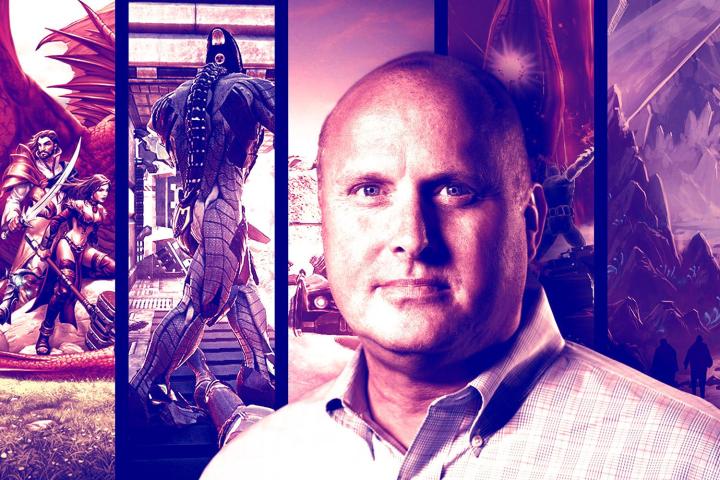
The PlayStation 4 and Xbox One are both designed with a PC framework in mind. There are still significant difference between a gaming PC and the new consoles, but developers can latch on to the similarities. Not only does that mean more and more studios will be developing for both platforms, it also means that the quality of the next gen games should ramp up quicker than in previous console launches since developers are already familiar with the tools and won’t have to spend years acquainting themselves with the new hardware.
“I think free-to-play on the consoles is just starting to scratch the surface”
We spoke with Smedley about developing on the PS4, the possible life of the systems, and the possible future of gaming.
How has this console launch been different for console launches in the past?
I think the single biggest thing with the PS4 is the memory. I think you’re starting to see a lot more skus lead on the PlayStation 4, because it’s frankly super easy to move it to the PC and vice versa.
How is developing for the PS4 different from PC?
It’s different from PC because you are dealing with a hardware base that is static. For us, being able depend on 8 GBs of RAM [in the PS4] is as good as it gets, so I’m stoked about it.
Does that change how you develop?
Well, because we’re able to patch the game, the development itself doesn’t change, the operation of the game changes quite a bit. The operation is difficult because we have to coordinate patches, and there are times when it takes a little longer on the console to patch because there are much more stringent QA requirements. Sometimes it takes a little longer. So to have the discipline and patience to do that right does take work.
Have there been any specific stumbling blocks to bringing PC games to the PS4? Will we see PlanetSide 2 on the PS4 soon?
We haven’t actually announced a date [for PlanetSide 2]. It’ll be early next year, but we aren’t really saying a date yet, mostly because we’re putting the finishing touches on stuff. It has been a super easy move because the architecture is so similar to what we’re working with.

The next-gen consoles are much more like PCs than previous systems …
Oh yeah.
Is that how the industry is going? Are we going to get to a point where there is no distinction between PCs and consoles?
You know, I think that is exactly what Valve is trying to do. My opinion is I don’t think they are going to be the same thing, and the reason for that is sort of the location. Yes, it’s true, you can put your PC in your living room and hook up to your TV, but most people just don’t do that. So I think what you’re going to see is those two probably remain a little separate.
Since you work on both PC and console, do you see any differences in the habits of gamers on each platform?
The single biggest one is the control mechanism, obviously. The mouse makes it a very different experience. What I really see, though, is more similarities than differences because games nowadays are going to be available on both, and it’s just going to be wherever you feel like playing. And I think that’s a good thing.
With games created for the PC first, what’s the process to convert those controls to a gamepad?
“It’ll be years before we see the real power [of the PS4]”
What were the biggest challenges to developing on three consoles (PS3, PS4, and PC) at once?
Probably the fact that coordinating the timing of the launch was difficult because there were so many changes. That means we didn’t just get one console approval, we got two, and we had to get the PC version ready to go. It was logistically challenging, but we pulled it off.
DC Universe Online originally debuted on January 2011 on PC and PS3 (and now on PS4), but you’ve been constantly updating and evolving it since. What lessons have you taken from that, that surprised you?
Probably the biggest one is that the PlayStation 3 players absolutely are bothered by the fact that PC players get their patches sooner. That was kind of a lesson learned. We treat that with much more care now because we’re able to patch fast on the PC. So the PlayStation players, when they hear that’s out there, this one global community definitely lets us know that we need to be putting the patch out on the same day.
After less than a year, DCUO went from subscription to free-to-play, and since then all SOE games have used that model. How is the switch working out?
It went over pretty well because we’ve been able to get a lot more people into the game now. I think free-to-play on the consoles is just starting to scratch the surface, and it’s such a great, captive audience that I think it will do very well there.
Is free-to-play the way to go, or is it just one option?
It’s definitely going to be one option, but I would venture to guess that it’s going to become the norm instead of the exception. But is it going to be the only one? No.
Some of the stuff coming out on PC, like EverQuest Next, is doing some remarkable stuff with things like AI. Will that translate to consoles?
Absolutely, and we’re very excited about the PS4. It’s got the horsepower to do it.

What about Runewaker’s Dragon’s Prophet?
Dragon’s Prophet we have no plans to bring to a console, only because it is a third-party game, one of the partners we work with. We have no intention of turning that into a console game, at least not right now.
With your strategy going forward, are you going to be looking at developing games for both PS4 and PC, or maybe do an exclusive for one or the other?
We’re always going to be doing games for PC and the latest Sony devices. We’ll definitely be bringing it to both. Not every game will be on both, some games don’t work as well on one system or another. It’s likely we’ll be doing a lot of PS4 stuff.
Since the PS4 architecture is more familiar than previous consoles, do you think we’ll see games hit their stride faster than with previous systems?
I do. In fact, on the PS3 people are just now getting the power output. Because, let’s face it, it’s very powerful but it can be hard to use, so people are just now getting the hang of it. The architecture on the PS4 is totally different and it’s very similar to PC, so they’re used to it.
So is it really easier to develop on the PS4 over the PS3, or is it just more familiar?
It’s by far easier to develop. First and foremost, you’re using tools you’re familiar with. Second, you’re using an architecture that, in my opinion, is one of the best in the world, but most importantly is familiar to them because they are familiar with the x86. And then if you take a look at the actual amount of people kind of going through it, they’ve been able to really pour people through to make sure that it’s a good experience.
The Last of Us is a good example of a game that impressed a lot of people late in the console’s life. Since the PS4 hardware is more similar to what PC devs are using, do you think we’ll hit a peak sooner, or will console devs continue to surprise us years from now?
“It’s likely we’ll be doing a lot of PS4 stuff.”
… And 40 GBs to install.
Yeah, a year ago that would have been unthinkable, especially for Call of Duty, kind of the flag bearer of mass market. So this environment is changing fast and I think because PC is so ubiquitous and because everybody uses one at work – or most people – I think we’re going to see a real renaissance.
How long will the next-gen hardware be relevant from a technological standpoint?
What I think ends up happening with consoles is that people learn to push the limits of what they can work with there. I think that tends to mean you have to get a lot more innovative than you do on the PC, where you cannot worry as much about memory and other stuff. So now that we’ve got such a powerful computer console underneath the hood there, it’s basically going to let [devs] go crazy. It’ll be years before we see the real power.
Things like improved graphics and sharing capabilities seem like obvious improvements to the next-gen systems in hindsight, but what do you think will come next for gaming, five or 10 years down the road?
I think you’re going to see the virtual reality stuff start to matter, and I think you’re also going to see new forms of controllers. I was very heartened to see Steam’s invention of a new controller. I’m not saying I like it or dislike it – I’m just saying it’s time somebody is innovating. To me those are positive developments.

So are you guys looking at integrating new peripherals like Oculus Rift?
Absolutely, we’re very interested in that and other peripherals. Oculus Rift is especially interesting, in no small part because we’re gamers ourselves and it’s just damn cool.
Is that something you can plan for yet though? Do you need to see if the market will accept it first or will you try it because, as gamers, you enjoy it?
Well, it’s also in our DNA. I mean, we are a company that prides itself on innovation, and we derive a lot of satisfaction when we’re making awesome games and we’re doing so with new tech. A good example is something called SOEmote. It’s something that is pretty basic that just nobody ever thought of doing before in an MMO, which is reusing your camera to read your face and apply it to your avatar. So we love this stuff. A lot of times, we’ll build it and hope then they come. Sometimes they do, sometimes they don’t, but from our perspective, we’re having a blast making it, so the journey is what we like.
Are you looking into new transmedia opportunities for SOE properties? Comics, books, and the like?
For our own IP, we are absolutely interested in doing that, and we’re looking at it pretty closely as a matter of fact. And although we don’t have any announcements to make right now, we’ve got some awesome deals we’ve put together that we can’t wait for the players to see.
Editors' Recommendations
- 3 underrated PS Plus games you should play this weekend (May 3-5)
- Best PS5 deals: Console bundles, top games, and accessories
- I was a PlayStation Portal hater. Now it’s one of my go-to gaming devices
- The best games on PlayStation Plus, Extra, and Premium
- How to factory reset a PS4 to fix issues or for resale


